Greek Shipper Pleads Guilty To Smuggling Iran's Sanctioned Oil

A Greek shipping company has pleaded guilty in the United States to smuggling sanctioned Iranian oil and agreed to pay a $2.4 million fine the Associated Press reported.

A Greek shipping company has pleaded guilty in the United States to smuggling sanctioned Iranian oil and agreed to pay a $2.4 million fine the Associated Press reported.
Documents unsealed by a US court made the case of tanker a seized by the US public part of the public record. for the first time the government seized around one million barrels of Iranian crude from the tanker Suez Rajan.
The saga began in February when the advocacy group United Against a Nuclear Iran reported the tanker’s involvement in illicit transfer of Iranian oil in the South China Sea. For months, the vessel was stranded off the coast of Singapore and then it sailed for the Gulf of Mexico, in what appeared to be seizure of the oil by the United States.
For a while, the oil was not offloaded, as it was reported that US companies were reluctant to get involved presumably because of threats by Iran. In the meantime, the Biden administration was involved in behind-the-scenes negotiations with Tehran over the release of five American hostages and potentially an unofficial nuclear deal.
After Congressional inquiries about why the oil was not being unloaded, the process began August 20 off the Texas coast.
Since the Trump administration pulled out of the JCPOA nuclear deal in 2018 and imposed sanctions on the sale of Iranian oil, Tehran found ways to boost its illicit shipments using a fleet of tankers, often moving without identification signals, and transferring cargoes to other ships in Asian waters before delivery to China.
These shipments have increased during the Biden administration. According to the latest figures, Iran shipped close to 2 million barrels a day in August, close to pre-sanction days.
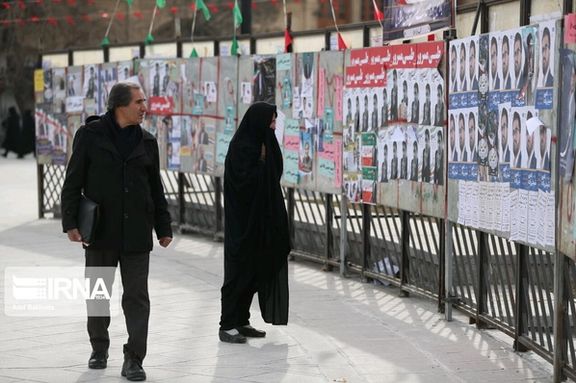
While Iranian conservatives aim to sideline reformists in the March 2024 parliamentary elections, there is a lack of consensus among them on many political issues.
The upcoming election, following a year of dissent and unrest, has left most voters indifferent, disheartened by disillusionment. There's a lack of clarity even among conservatives and hardliners about the number of seats they aim to secure. For instance, the Islamic Coalition Party intends to nominate 400 candidates for the 290 Majles seats, reflecting the overall apathy towards the election.
Hardline Conservatives have repeatedly said that they are keen to win the entire parliament, and reformists and moderates have often complained that the system does not allow them to run for the Majles or Presidency.
Although ultraconservative Paydari Party is doing everything to win the majority, Hamid Reza Taraqqi, a leading member of the Islamic Coalition Party said in an interview with Khabar Online that five different conservative coalitions have been formed ahead of the elections.
To make the situation look even more complicated for observers and the conservatives aiming for a full power grab, Taraqqi added that these five coalitions represent 10 different narratives. The main narrative, however, is to turn the Iranian political landscape into an all-conservative playground. All other sub-narratives try to prove that there are individual parties such as Paydari, which favor a non-elected Islamic government rather than the current Islamic Republic, or coalitions such as Sharian (Persian acronym for the Strategic Network of Friends of the Islamic Revolution) that wish to monopolize political power and financial privilege in Iran.
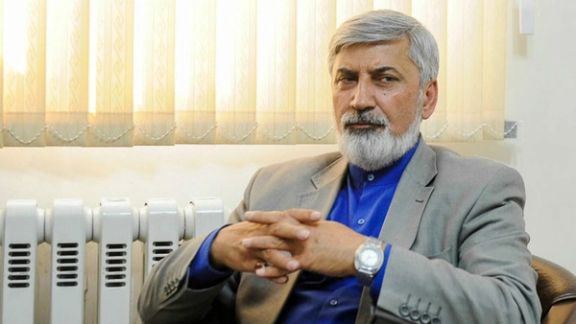
Sharian, led by Roads and Transportation Minister Mehrdad Bazrpash and former lawmaker Hamid Rasaei, seems to serve as an alternative route to the Majles for Paydari should their pro-Russia stance or lack of results in the current parliament render them unelectable.
Another group led by ex-Paydari politicians, including former President Mahmoud Ahmadinejad, and his aides Esfandiar Rahim Mashai and Hamid Baqaei is aiming to contest the Majles. Ahmadinejad himself is apparently preparing to run for the 2025 Presidential election. He has recently been criticizing the government's policy on hijab and purging dissident university professors.
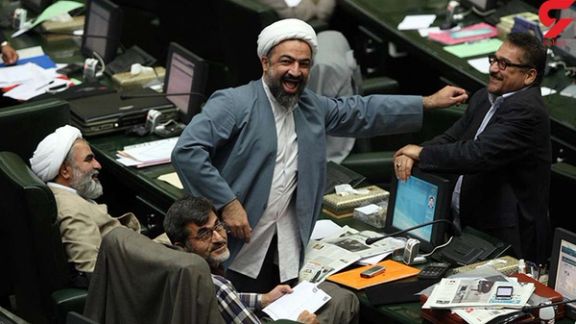
Besides these three ultraconservative groups, there is Majles Speaker Mohammad Bagher Ghalibaf's neo-con group, moderate conservative Ali Larijani, former Speaker, with his own list of candidates, and the traditional conservative Islamic Coalition Party. Disputes arise due to the refusal of these groups, except for the moderate-conservatives possibly joining reformists, to entertain power-sharing or compromise, adhering to the all-or-none approach within Iran's conservative camp.
This inflexible view leads to conflicts among the six groups. Differences between figures like veteran politician Haddad Adel and Bazrpash are evident. Additionally,
a report by the centrist Ham Mihan newspaper, which was also carried by many Iranian websites, indicates fierce competition between Ghalibaf and Bazrpash over who is Supreme Leader Ali Khamenei's favorite. According to Ham Mihan, three months ago Ghalibaf warned other conservatives not to mudsling against him as he was Khamenei's favorite.
And all this is happening while critics and even some insiders say that the Majles has lost its authority as most major decisions on domestic and foreign policies are made or endorsed by the heads of the three powers or the Expediency Council. Only 290 seats of debatable importance for so many parties and groups remind one of the Persian proverbs, "One raisin to feed 40 vagabond dervishes."
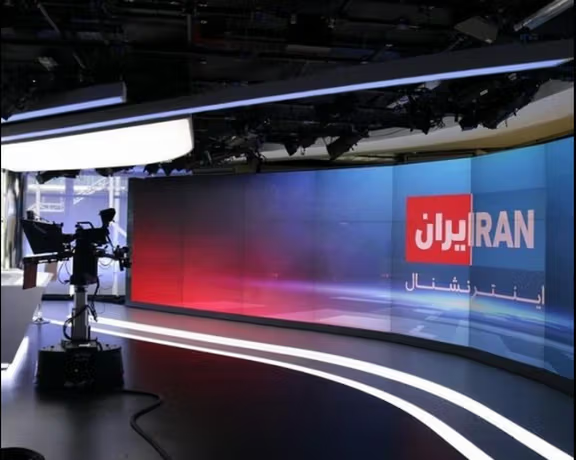
A recent opinion survey has shown that the majority of Iranians follow news from foreign-based media outlets, with Iran International being their top choice.
The survey by the Netherlands-based Gamaan institute collected information from 38,445 people inside Iran about their views on media, revealing that only about 21 percent of the respondents followed the developments about Iran from the state-run Islamic Republic of Iran Broadcasting (IRIB).
This 10-day online survey titled "Iranians' Attitudes Towards Media in 1402 Persian Calendar Year” (started March 21), targeted literate individuals aged 19 and above, a sample from 90% of the country's adult population. GAMAAN, the Group for Analyzing and Measuring Attitudes in Iran, is an independent, non-profit research foundation, focused on Iranians’ attitudes towards social and political topics.
The survey explored key indicators such as the "most popular channel," the "most trustworthy channel according to the audience," and the "primary source for following news of protests in Mahsa's movement." The results indicate that more than half of the respondents consider Iran International as their primary source of information and news about Iran.
Iran International leads the pack with 54% cited as "often" or "sometimes" following the media outlet. Manoto TV garnered 42%, BBC Persian" 37%, IRIB 36%, and Voice of America Persian 34%. Additionally, about 32% claim to occasionally or more frequently watch Jam-e-Jam (the international bundle of IRIB channels) and 30% tune into MBC Persia. On the other hand, 48% of the population have stated that they never watch or listen to programs on the state broadcaster.
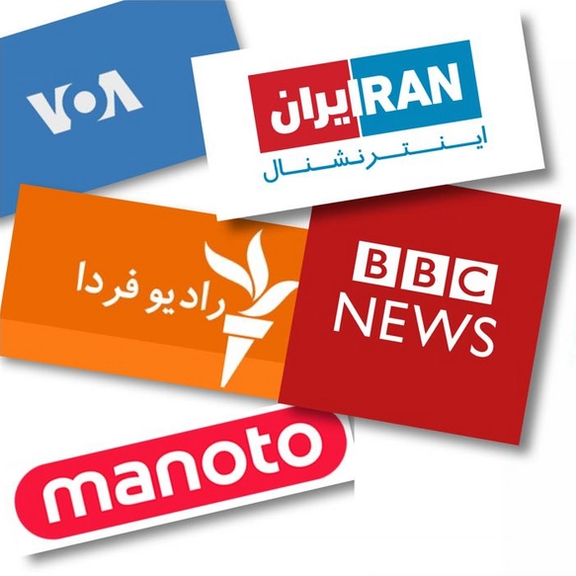
When asked, "Which media outlets did you primarily follow for news about recent protests in Iran?" 57% indicated they followed news from Iran International, 30% from Manoto, 26% from BBC Persian, and 20% from Voice of America. Approximately 19% also received news about the protests from the IRIB, the state broadcaster tightly reflecting the views of the regime's hardliners.
In response to a question regarding the level of trust in media outlets, 50% express "a great deal" or "some" confidence in Iran International, 44% in Manoto, 42% in Voice of America, 40% in Radio Farda, and 34% in BBC Persian. On the other hand, only about 21% of the population trust state-run IRIB, while 59% have stated that they have "no trust at all" in the regime’s broadcaster.
According to the results of this survey, 68% of the population "often" use social media networks for obtaining information and news about Iran and the world, while 35% are viewers of satellite channels, 12% rely on state broadcaster IRIB, and 8% tune into foreign radio for the news.
Among social media platforms, approximately 65% of the population "often" use Instagram, 46% use WhatsApp, 43% use Telegram, 17% use YouTube, 8% use domestic app Rubika, 8% use Twitter, 5% use Facebook, 3% use state-run platform Soroush, and 2% use Clubhouse for their online activities. All international social media platforms are blocked Iran, with people using VPNs to circumvent the censorship.
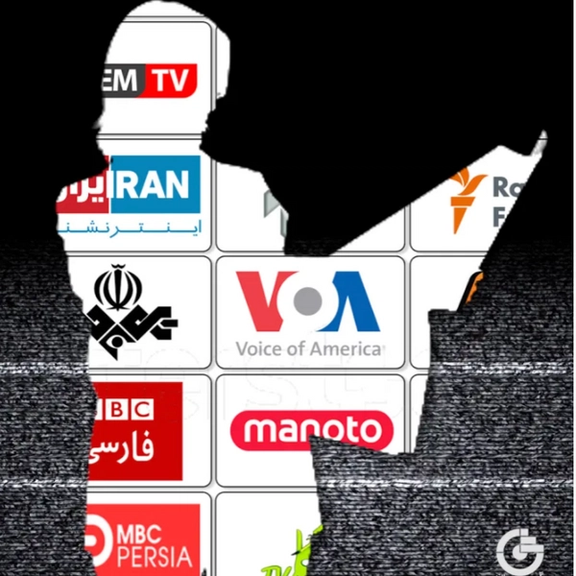
IRIB is tightly controlled by the office of Iran’s authoritarian ruler Ali Khamenei and has been losing its audience with its heavy religious programming and heavily censored news and biased programs. Critics say it is nothing but a propaganda tool with a hefty government subsidy of at least $600 million and no accountability.
In June, the regime took one more step to tighten its control over entertainment content in line with its policy of enforcing religious restrictions on the population, gaining full control over content shown by privately-owned streaming services based on a decision taken by Iran's Supreme Cultural Revolution Council.
Streaming services such as Filimo, an online video on demand (VOD) service like Netflix, have gained great popularity in Iran where there are no privately-owned television networks. These services provided an opportunity for independent and sometimes dissident filmmakers and artists to showcase their work. The head of the state broadcaster (IRIB), hardliner Payman Jebelli, in a letter to President Ebrahim Raisi in January demanded that Filimo be blocked on the internet.
Earlier this year, NGO Reporters Sans Frontiers, ranked Iran 177/180 nations for press freedom, citing the arrest of 70 Iranian journalists since the death of Mahsa Amini as one example of the regime's crackdown on voices of dissent. Iran International's reporters were threatened earlier this year by IRGC and intelligence (MOIS) agents, forcing some to relocate from London to Washington amidst security threats. Iranian journalists abroad have also been deluged with threats to their lives.
This year's Freedom House report on global freedoms also ranked Iran 12th in the 100 least free countries in the world.
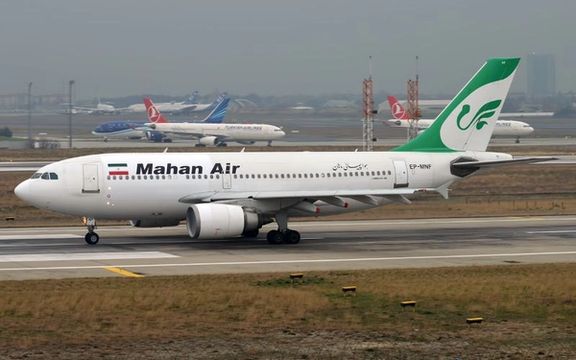
Mahan Air, a sanctioned Iranian airline with ties to the Islamic Revolutionary Guard Corps (IRGC), has reportedly imported an Airbus A340 to Iran via Indonesia.
The aviation news website ch-aviation, revealed that Mahan Air successfully imported the Airbus A340-200, with the registration EP-MJA (serial number 75), to Iran, raising questions as to its procurement.
The 28-year-old Airbus A340, adorned with Mahan Air's livery, was seen at Tehran Mehrabad Airport in early August, although it has not yet been put into active service.
This latest addition marks the tenth A340 in Mahan Air's fleet. The airline, nominally a privately-owned entity, maintains close affiliations with the Islamic Revolutionary Guard Corps-Quds Force (IRGC-Quds Force), which resulted in Western sanctions.
In 2011, the United States imposed sanctions on Mahan Air, accusing the airline of aiding the Quds Force in covertly transferring weapons and personnel to various regions, including Syria.
Mahan Air currently operates six A340-300s and three A340-600s, making it the second-largest operator of the A340 globally, trailing behind Lufthansa (LH) based in Frankfurt International Airport.
Dutch sources reported earlier this year that the aircraft sold to Mahan Air previously belonged to the French Air Force. It was also reported that Mahan Air had not provided details regarding the purchase amount of the aircraft, citing the severe sanctions imposed on Iran's aviation industry as a possible reason for the lack of transparency.
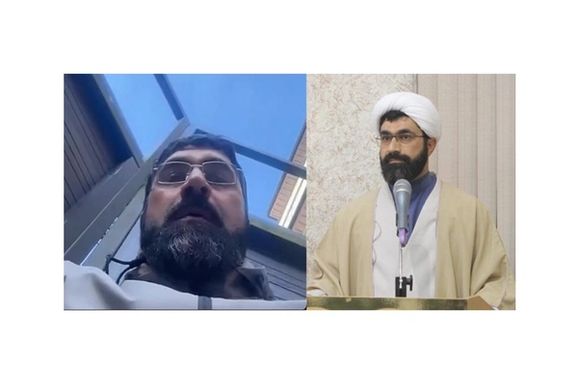
Calls to shut down an Iran-linked mosque are growing among Iranians in Finland after the Islamic center admitted that one of its imams snatched a protester’s cellphone.
Parvin Shokri, an Iranian protest organizer based in Helsinki, was returning from an anti-regime demonstration on April 24, when her cellphone was seized by a stranger in the street. She was streaming live on Instagram, something the snatcher was not aware of. As the footage shows, he grabbed the phone, ran away for nearly a minute and while panting took a peek at the phone screen, making his face seen by Shokri’s followers.
Upon seeing his face on the phone screen, the snatcher decided to bury the phone in a nearby lawn in eastern Helsinki, where Shokri would ultimately find it via geolocation, she told Iran International.
The protester, who has been an active organizer of anti-regime events in Finland, immediately reported the matter to the police, triggering an an ongoing investigation. She also started spreading the word by talking to Finnish and Persian media, saying that the man, who appeared on her Instagram Live video, is actually Behrouz Hosseinpour, an imam connected to Resalat Islamic center in Helsinki.
Shokri said that she “did not even know” the man before the incident, and that she learned of his identity through other anti-regime activists after releasing the footage on social media.
Upon these revelations, Resalat Islamic Community released a statement on its Telegram channel on September 1, admitting that it was indeed Hosseinpour, a “guest speaker,” who grabbed Shokri’s phone. The regime-linked Islamic Community cited her “threats” against members of the mosque as well as attempts to record video of religious events “without permission” as reasons that prompted the imam to act.
After reviewing the recorded video, Shokri noticed that Hosseinpour and another man had been following her prior to the attack and she believes they must have tracked her by following her 11-year-old daughter, who was supposed to meet her at a flea market in eastern Helsinki following the protest.

Shokri, who is originally from the southern Iranian city of Izeh, an epicenter of protests in the Woman, Life, Freedom movement, told Iran International that her daughter also recognized the snatcher as the man who had been following her to and from school for a while.
The Iranian diaspora in Finland has been calling for a shutdown of the center, arguing that similar to many other so-called Islamic centers such as the ones in Frankfurt or London, it is funded by Iran’s regime to track and bully Iranian dissidents.

Resalat Islamic Center said in its statement, published in both Finnish and Persian, that Hosseinpour “notified us later,” of the incident, indirectly claiming that it had no prior knowledge of the assault on Shokri. Resalat said that it is a victim of “baseless harassment and threats” by Islamophobes and right-wing activists, who frequently vandalize its premises and intimidate its members.
The statement also described Hosseinpour’s phone grabbing as an attempt to delete videos and photos that the protester had shot to “destroy his character”. Shokri said that her 42-minute live streaming, whose footage is still available on her phone, was merely about the flea market in Helsinki and had nothing to do with the mosque. She also said that this is not the first time she has been assaulted by people allegedly linked to the mosque.
The Islamic center claims that it is independent but has also shrugged off calls by Finno-Iranians to condemn violence perpetrated by Iran’s regime against protesters and activists. According to Helsingin Sanomat, Finland's largest subscription newspaper, Resalat founder Madjid Bahmanpour has “said in several interviews that the mosque received funding from ayatollahs in Iran and Iraq.”
Bahmanpour, whose son, Abbas, is an imam at the Islamic center, is a former member of the Iran's Revolutionary Guards Corps (IRGC), designated as a foreign terrorist organization by the United States. Majid and Abbas Bahmanpour, who are quite well known among the Iranian diaspora in Finland, have been at the helm of the center since 2001 and managed to recruit some 1,500 members, who are mostly first-generation immigrants from Afghanistan, Iraq and Iran.

While an investigation into the matter continues, the Islamic center is also busy holding events in and outside of the mosque, which occasionally draw ire from the Iranian community in the Helsinki area.
Ever since Mahsa Amini’s death in custody of hijab police in Iran on September 16, 2022, Finnish Iranians have held several protests, some in front of the Resalat mosque, calling on the Finnish government to support the movement and shut down the Islamic center. Protests against Iran’s regime in Finland have taken place not only in the capital, but also in much smaller cities, where the number of resident Finno-Iranians is not necessarily large.
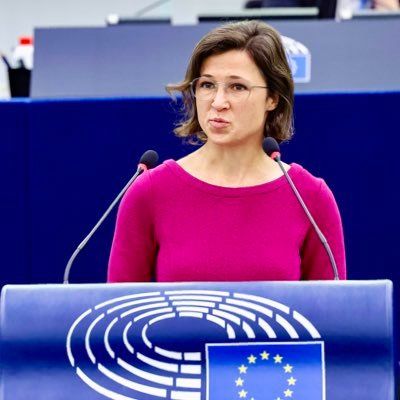
Member of the European Parliament Hannah Neumann led a petition addressed to EU Foreign Policy Chief Josep Borrell concerning the prolonged imprisonment of an EU citizen by the Islamic Republic.
In a message on X social network, MEP Neumann along with Cornelia Ernst, Bart Groothuis, and Dietmar Köster, expressed their concerns, stating, "We have some questions regarding the hostage-taking case of Johan Floderus."
Johan Floderus, a 33-year-old member of the EU diplomatic corps, has been held covertly in Iran for over 500 days as part of Iran's hostage diplomacy, as reported by The New York Times. Floderus was arrested at Tehran airport in April 2022, during what was described as a private tourist trip with friends.
MEP Neumann said the issue raises concerns for the safety of other EU citizens. "Any European in Iranian captivity is one too many. However, with the arrest of Johan Floderus, the Iranian regime is escalating the situation further and worsening already strained relations. This incident is outrageous and requires prompt clarification," she said.
The letter directed to Josep Borrell seeks answers to critical questions, including how long the EU has been aware of the Swedish citizen's imprisonment in Iran, reasons behind the lack of public communication on this matter, and the measures undertaken by the EU to secure the release of Floderus.
Members of the European Parliament have pressed Josep Borrell for answers, urging him to respond to the inquiries urgently.






